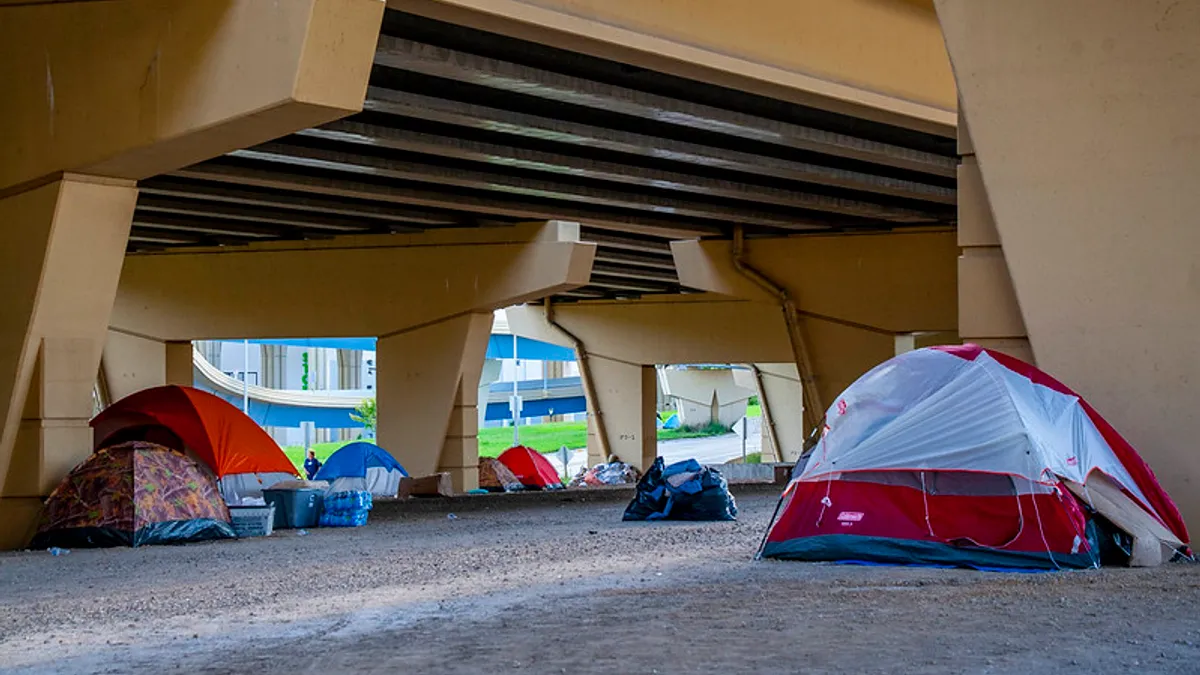Counting people experiencing homelessness for the census has historically been a major challenge. Those obstacles are poised to become even greater due to the new coronavirus pandemic.
Service-based enumeration, a three-day operation that involves counting people in-person at places like soup kitchens and encampments, is one of the primary ways that cities and census workers count homeless populations. The enumeration was originally scheduled to begin March 30, but has been delayed until April 29.
With many tactics for counting people experiencing homelessness in flux from the coronavirus, compounded by an exacerbated sense of fear among homeless populations, experts caution that achieving an accurate count will be difficult this year.
"Counting the homeless is an incredibly difficult job under the best of circumstances," Jennifer Mosley, associate professor at the University of Chicago's School of Social Service Administration, told Smart Cities Dive. "These circumstances make it immeasurably worse."
The added obstacles to achieve a complete count
The global outbreak of COVID-19 is predicted to disproportionately affect people experiencing homelessness. In fact, homeless populations are twice as likely to be hospitalized during the pandemic, up to four times as likely to require critical care and up to three times as likely to die compared to the general public, according to a recent report from researchers at University of Pennsylvania, University of California Los Angeles and Boston University.
The risks of COVID-19 incentivize people experiencing homelessness to stay away from group areas, which can include shelters or encampments, according to Mosley.
Additionally, many homeless service providers won’t have the capacity for extra tasks, which will increase the difficulty of reaching or counting homeless groups, Mosley said. And it's possible fewer enumerators will become available to conduct the count as the time gets closer.
A lack of access to the internet is another obstacle for homeless populations, Cara Brumfield, a senior policy analyst at the Georgetown Center on Poverty and Inequality, told Smart Cities Dive. With the census moved primarily online for the first time this year, many libraries were prepared to help address the digital divide by providing access to computers, internet and trained library staff.
Due to COVID-19, many of the country's more than 16,500 libraries are now closed, further limiting access to the online survey for homeless groups.
The closure of libraries is a "huge blow," Mosley said.
The mounting stakes
There's a chance cities will experience a spike in homelessness during the pandemic, making it even more difficult to count the group and adding to the country's already growing rate of homelessness.
Even though evictions have been halted in many cities, they might still occur to vulnerable groups. Individuals who are "couch surfing" or staying with friends or family, might also be asked to leave those homes for fear of spreading the virus, which could lead to homelessness, Mosely said.
The stakes for California to achieve an accurate count of people experiencing homelessness, for example, are particularly high. The state experienced the largest increase in homelessness last year (16.4%) compared to every other state combined. And Los Angeles alone has been estimated to have about 50,000 people sleeping on its streets at a given time.
"There's nothing typical about the situation we're seeing in terms of the increase in homelessness in L.A. and other high-cost cities," John Parvensky, acting executive director of the National Coalition for the Homeless, told Smart Cities Dive in an earlier interview.
An undercount also creates major implications for the billions of dollars that fund various city services assisting homeless groups.
The census is a "statistical backbone of research communities," Brumfield told Smart Cities Dive in an earlier interview. There’s a lot at stake in terms of political influence and financial resources, she said. Some of the programs that could be impacted by an undercount include the Section 8 Housing Choice Vouchers Program and the SNAP program used by over 40 million low-income families.
Despite the high stakes, the means for counting people experiencing homelessness — even before this unprecedented pandemic — are not sufficient.
"There’s more that we could be doing," Brumfield said. "We have these operations but are they perfect? Absolutely not. There’s a lot of ways for people to be missed by those operations."
To keep up with all of our coverage on how the new coronavirus is impacting U.S. cities, visit our daily tracker.













